PFAS Management Strategies in the United States and Europe
Sponsored by: U.S. EPA and Common Forum on Contaminated Land
The management of perfluoroalkyl and polyfluoroalkyl substances (PFAS) is an issue of global concern. Across the world, countries are developing their own methods and approaches to managing PFAS. The United States Environmental Protection Agency (US EPA) has partnered with the Common Forum on Contaminated Land for this webinar to highlight PFAS policy, actions and guidance in the United States Superfund Program, select countries within the European Union (EU), and Australia. The purpose of this webinar is to provide information on PFAS management approaches in the US, EU, and Australia to encourage knowledge transfer and information exchange to increase the awareness of how PFAS is being managed in different parts of the world and what research is telling us about the destruction and disposal of PFAS. The topics this webinar will cover include the following:
- Comparative approaches to PFAS contaminated soil management in the EU, Australia, and the United States
- Cooperation at European level to tackle PFAS in soil and groundwater
- European policymakers have set up various forms of cooperation to coordinate the approach to PFAS in soil and groundwater. Such as the Common Forum PFAS team, the establishment of the EmConSoil network and the collaboration of four European countries. Common Forum's PFAS team also works closely with NICOLE's PFAS working group.
- The U.S. EPA's recent actions and key guidances for managing PFAS
- PFAS pollution and agricultural land use - a German example
- If arable land is contaminated with high levels of PFAS, the substances also find their way into feed and food. Large-scale contamination can hardly be remediated. A system of pre-harvest monitoring and cultivation recommendations has been established in one region of Germany to ensure that the land can still be used for agricultural purposes.
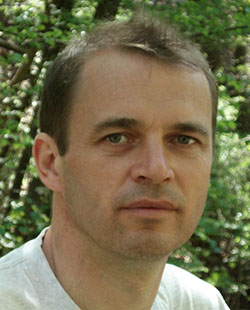 Johan Ceenaeme, Soil Management Department, OVAM (johan.ceenaeme@ovam.be)
Johan Ceenaeme, Soil Management Department, OVAM (johan.ceenaeme@ovam.be)
Johan Ceenaeme works as a senior soil expert and policy coordinator in the Soil Management Department of OVAM, the Public Waste Agency of Flanders (Belgium). He is responsible for the coordination of the Flemish policy on contaminated soils, more specifically with regard to PFAS. Johan is involved in the international contacts related to soil remediation policy and is representative in the European Soil Expert Group and the Common Forum, where he co-chairs the PFAS team. His main domains of expertise are legislation on soil remediation and developing a policy for PFAS contaminants. He started with colleagues and other partners the EmConSoil network.
 Katrine Hauge Smith, WSP Denmark (katrine.smith@wsp.com)
Katrine Hauge Smith, WSP Denmark (katrine.smith@wsp.com)
Katrine Hauge Smith works as a PFAS specialist in WSP Denmark, where she works with PFAS in soil, groundwater, building materials and waste. Katrine has been responsible for making a comparative study of different countries strategies for management of PFAS in soil, which has been published by the Danish EPA. Katrine has also worked at the Danish EPA with policies and strategies for soil and construction waste and soil quality criterias.
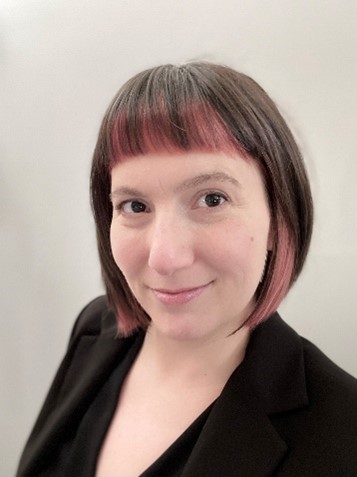 Cindy Frickle, U.S. EPA Office of Superfund Remediation and Technology Innovation (frickle.cynthia@epa.gov or 202-566-0927)
Cindy Frickle, U.S. EPA Office of Superfund Remediation and Technology Innovation (frickle.cynthia@epa.gov or 202-566-0927)
Cindy Frickle is a physical scientist with EPA's Superfund program where she reviews and propagates technical information to site cleanup professionals through Clu-In, EPA forums, and interagency channels. Prior to joining EPA, she spent time characterizing contaminated sites, coring sediments, studying microbes, and teaching. She completed her Biogeology MS and Geology BS in the University of Minnesota's School of Earth Sciences.
Thabet Tolaymet, U.S. EPA (tolaymet.thabet@epa.gov)
Thabet, currently serving as an Assistant Center Director at the Center for Environmental Solutions and Emergency Response, has been an Environmental Engineer at the U.S. Environmental Protection Agency in Cincinnati, Ohio, since 2004. In his current role, Thabet oversees research activities within the Sustainable and Healthy Communities Research Program, assisting in the efforts to develop innovative environmental solutions to address remediation and materials management needs. Previously, Thabet served as an Acting Assistant Laboratory Director for Land and an Associate National Program Director for nanomaterials and sustainability, where he has driven strategic program planning and research prioritization. He also contributed to the National Science and Technology Council Committee, focusing on nanotechnology.
As a researcher, Thabet's focused on sustainable landfill technologies, the environmental impacts of nanomaterials, and the safety and sustainability of end-of-life management of PFAS. Over his career, Thabet has authored more than 80 peer-reviewed manuscripts in the areas of materials management, nanomaterials, and more recently PFAS. Thabet is also a co-author of the book "Sustainable Practices for Landfill Design and Operations," published by Springer in 2015, and has contributed to significant EPA reports that have set standards in landfill management and environmental safety.
Currently, Thabet is the subgroup lead for the Disposal and Leachate Treatment sections of the Second Interim PFAS destruction and disposal guidance.
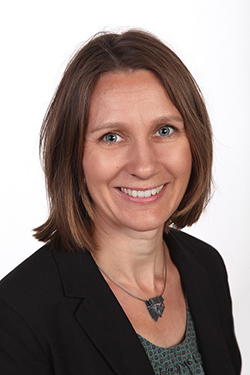 Annegret Biegel-Engler, German Environment Agency (annegret.biegel-engler@uba.de)
Annegret Biegel-Engler, German Environment Agency (annegret.biegel-engler@uba.de)
Annegret Biegel-Engler is head of the section "Measures of Soil Protection" at the German Environment Agency. Together with her team, she is responsible for the further development of the requirements for the protection of soils in accordance with the German Federal Soil Protection Act. With regard to PFAS, the current focus is on the derivation of soil values for different uses with regard to human health, the determination of background levels and the development of proposals for the management of contaminated sites. Before joining to the soil section, Annegret had worked as a scientific officer at the German Environment Agency with a focus on regulation of PFAS and other emerging pollutants under REACH, the EU chemicals regulation.
Moderators:
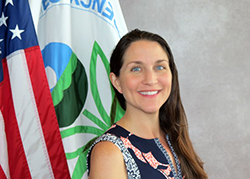 Jean Balent, U.S. EPA Technology Innovation and Field Services Division (balent.jean@epa.gov or 202-566-0832)
Jean Balent, U.S. EPA Technology Innovation and Field Services Division (balent.jean@epa.gov or 202-566-0832)
Ms Balent is on the staff of the EPA's Technology Innovation and Field Services Division where she has worked to collect and disseminate hazardous waste remediation and characterization information since 2003. Ms Balent manages the Clean Up Information Network website and actively supports online communication and collaboration resources available to EPA. She formerly worked with the US Army Corps of Engineers Environmental Engineering Division in the Buffalo District. Ms Balent was also a member of the SUNY-Buffalo Groundwater Research Group where she constructed and tested large scale models of groundwater flow. Ms Balent has also conducted research relating to the Great Lakes, environmental remediation, and brownfields re-development. She holds a Bachelor's degree in environmental engineering from SUNY-Buffalo and a Master's degree in Information Technology from AIU.
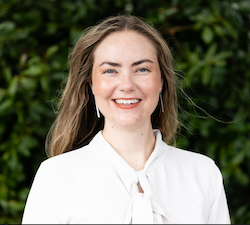 Vanessa Van Note, Acting NPL Rule Manager (VanNote.Vanessa@epa.gov or 202-566-1826)
Vanessa Van Note, Acting NPL Rule Manager (VanNote.Vanessa@epa.gov or 202-566-1826)
Vanessa is an Environmental Engineer working with the EPA's Office of Superfund Remediation and Technology Innovation (OSRTI) where she is temporarily managing proposing and listing sites to the National Priorities List (NPL). As an engineer in the Superfund Site Assessment Program, she assists regions in the development of their Hazard Ranking System packages and contributes to training, PFAS roadmap implementation, community involvement and environmental justice. She serves on the OLEM climate adaptation team, partnering with other programs on furthering climate change initiatives, including directing climate vulnerability assessment technical support. She obtained her B.S. in Environmental Engineering Sciences from the University of Florida and is pursuing her professional certification. Prior to joining HQ, she worked for the Superfund Optimization Program and in environmental modelling at the Chesapeake Bay Restoration Program. Prior to coming to EPA, she worked in utilities, transportation, manufacturing and aviation.
 Christian Andersen, Information Centre for Environment and Resources
Christian Andersen, Information Centre for Environment and Resources
Christian works at the Information Centre for Environment and Resources in the Danish Regions. Here he supports the regional investigation and remediation programs. He is a secretary to the Danish mega-site program and has been a representative to the Common Forum since 2010. Prior to the regions he worked as a consultant in soil and groundwater investigation. Christian holds an M.Sc. in geology from Queens University, Ontario.
-
 Slide Presentation VanNote and Anderson Welcome Slides (334KB/PDF)
Slide Presentation VanNote and Anderson Welcome Slides (334KB/PDF)
-
 Slide Presentation Smith WSP (960KB/PDF)
Slide Presentation Smith WSP (960KB/PDF)
-
 Slide Presentation Ceenaeme, Cooperation European (9.08MB/PDF)
Slide Presentation Ceenaeme, Cooperation European (9.08MB/PDF)
-
 Slide Presentation Biegel-Engler, PFAS Pollution and Agricultural Land Use (624KB/PDF)
Slide Presentation Biegel-Engler, PFAS Pollution and Agricultural Land Use (624KB/PDF)
-
 Slide Presenation Tolaymat PFAS Landfill (2.17MB/PDF)
Slide Presenation Tolaymat PFAS Landfill (2.17MB/PDF)
Webinar Slides and References:
-
 Slide Presentation VanNote and Anderson Welcome Slides (334KB/PDF)
Slide Presentation VanNote and Anderson Welcome Slides (334KB/PDF)
-
 Slide Presentation Smith WSP (960KB/PDF)
Slide Presentation Smith WSP (960KB/PDF)
-
 Slide Presentation Ceenaeme, Cooperation European (9.08MB/PDF)
Slide Presentation Ceenaeme, Cooperation European (9.08MB/PDF)
-
 Slide Presentation Biegel-Engler, PFAS Pollution and Agricultural Land Use (624KB/PDF)
Slide Presentation Biegel-Engler, PFAS Pollution and Agricultural Land Use (624KB/PDF)
-
 Slide Presenation Tolaymat PFAS Landfill (2.17MB/PDF)
Slide Presenation Tolaymat PFAS Landfill (2.17MB/PDF)
Additional Resources:
- EPA Interim Guidance on Destroying and Disposing of Certain PFAS and PFAS-Containing Materials That Are Not Consumer Products
- ICCL
 PFAS in Soil
PFAS in Soil- EmConSoil
- EmConSoil Publications
- International Workshop on Emerging Policy Challenges on New Soil Contaminants (ENSOr)
- Registration Form for EmConSoil Network
- EPA's PFAS Website
- EPA's PFAS Research
- EPA Interim Guidance on the Destruction and Disposal of Perfluoroalkyl and Polyfluoroalkyl Substances and Materials Containing Perfluoroalkyl and Polyfluoroalkyl Substances; Notice of Availability for Public Comment
Thank you for participating in our webinar. We would like to receive any feedback you might have that would make this service more valuable.
Help & FAQs
- Frequently Asked Questions
- Content Questions?
Call Vanessa Van Note at 202-566-1826 or vannote.vanessa@eps.gov - Technical Problems?
Leave us a comment - Cancel Your Registration
- My Participation Records
- CEU Credits and PDHs
Zoom Resources
Before Webinar Day
This seminar will be delivered through Zoom. Participants are encouraged to update to the latest version of the Zoom application for the best experience.
If you are unable to install the Zoom application, most functions will be available if you join just using a modern web browser such as Chrome, Edge or Firefox. We strongly encourage you to run the Zoom Meeting Test prior to attending this webinar. Technical support on the day of the webinar will be very limited and subject to significant delays.
Backup Conference Call
If you cannot participate using online audio, you may join the optional call in line. After checking in for the live event using the instructions listed below, you will see several options to participate. Please click the links in option 4 to follow along by phone and obtain the call in number. If you cannot access the phone number, you may request the call in line from the event moderator in the Q&A or send an email to Jean Balent at balent.jean@epa.gov
Click on "Join Webinar" at the top of this screen, enter your exact first and last name as you registered and enter the number of people attending at your location (including yourself). You should then be taken to the Zoom meeting room. Join with Zoom Application: For those joining with the Zoom application, you may be prompted to sign with a zoom account or join as a guest without signing in.
If joining as a guest, you will be prompted to enter your name and email address. Remember your name, image, video or voice may be visible to others in the live event. When done, click "Join" When it is time for the live event to start, the meeting host will admit you to the live Zoom meeting. Join via web browser (without the Zoom Application): For those joining with a web browser, you may close any pop ups prompting you to download the Zoom app. The next window will allow you to enter your name (first name and last name) and check the box that you are not a robot. Click the blue join button. You may also be asked to provide your email address before joining the room. Remember your name, image, video or voice may be visible to others in the live event. When done, click "Join" When it is time for the live event to start, the meeting host will admit you to the live Zoom meeting. You may need to periodically refresh the browser window to confirm if the host has admitted you. The presenters will control what slide you are viewing. You may submit questions online for the instructors to answer during the webinar by typing in the "Q&A" area. It is not necessary to wait until the question and answer periods to submit questions. At the end of the webinar you will be guided to our feedback form and links to additional resources, including the complete presentation. These links will remain active after the webinar. Provided for your convenience. Importing or accepting the invitation within this iCalendar file is not required, and declining the invitation does not cancel your registration. For additional information on iCalendar, please see our
iCalendar Help It is EPA's policy to make reasonable accommodation to persons with disabilities wishing to participate in the agency's programs and activities, pursuant to the Rehabilitation Act of 1973, 29 U.S.C. 791. Any request for accommodation should be made to at or , preferably one week or more in advance of the webinar, so that EPA will have sufficient time to process the request. EPA would welcome specific recommendations from requestors specifying the nature or type of accommodation needed. EPA welcomes specific recommendations from requestors specifying the nature or type of accommodation needed. Please note that CLU-IN provides both alternate phone call-in options and closed captioning for all webinars, and requests for these specific accommodations are not necessary.
Webinar Day, Checking In
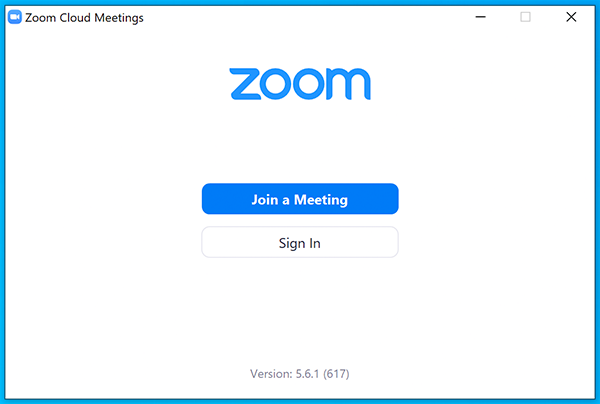
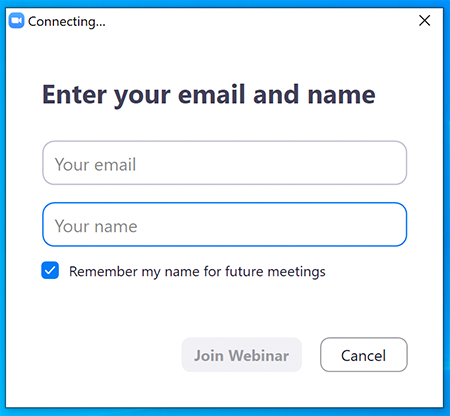
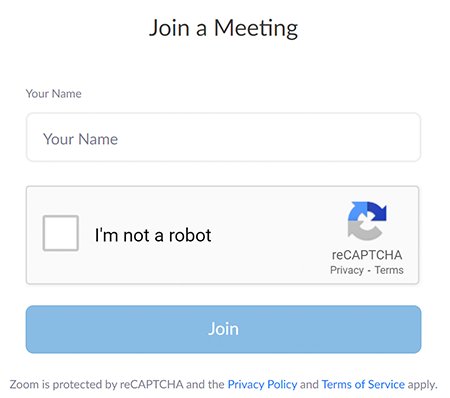
Moving Through Slides
Feedback & Links to Additional Resources
iCalendar File
Rehabilitation Act Notice for Reasonable Accommodation
Rehabilitation Act Notice for Reasonable Accommodation
It is EPA's policy to make reasonable accommodation to persons with disabilities wishing to participate in the agency's programs and activities, pursuant to the Rehabilitation Act of 1973, 29 U.S.C. 791. Any request for accommodation should be made to at or , preferably one week or more in advance of the webinar, so that EPA will have sufficient time to process the request. EPA would welcome specific recommendations from requestors specifying the nature or type of accommodation needed. EPA welcomes specific recommendations from requestors specifying the nature or type of accommodation needed. Please note that CLU-IN provides both alternate phone call-in options and closed captioning for all webinars, and requests for these specific accommodations are not necessary.
Webinar Recording
By participating in this CLU-IN webinar, you automatically agree to authorize recording of audio and visual content presented during this live event and consent to subsequent use of this recording in the public domain by the U.S. Environmental Protection Agency. This recording may include questions, comments and poll responses provided by you during the live event in addition to your name, voice, image or likeness. This recording will be made available after the conclusion of the live event as part of the CLU-IN webinar archives, and will remain available indefinitely. If you do not wish to consent to the recording, please do not join the live event, and contact Jean Balent at 202-566-0832 or balent.jean@epa.gov to discuss your concerns.
Content Disclaimer
This webinar is intended solely to provide information to the public. The views and opinions expressed as part of this webinar do not necessarily state or reflect those of the U.S. Environmental Protection Agency. It is not intended, nor can it be relied upon, to create any rights enforceable by any party in litigation with the United States, or to endorse the use of products or services provided by specific vendors. With respect to this webinar, neither the United States Government nor any of their employees, makes any warranty, express or implied, including the warranties of merchantability and fitness for a particular purpose, or assumes any legal liability or responsibility for the accuracy, completeness, or usefulness of any information, apparatus, product, or process disclosed, or represents that its use would not infringe privately owned rights.

